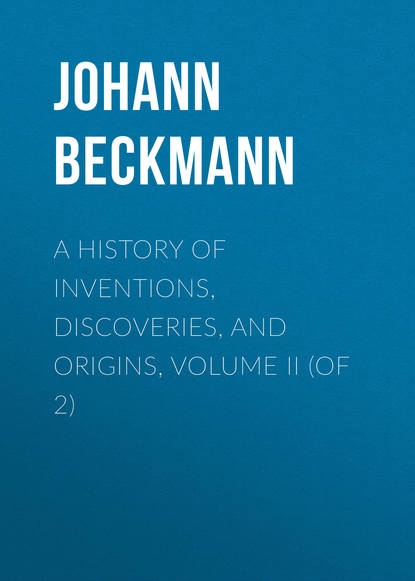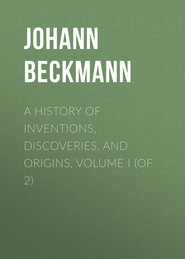По всем вопросам обращайтесь на: info@litportal.ru
(©) 2003-2024.
✖
A History of Inventions, Discoveries, and Origins, Volume II (of 2)
Настройки чтения
Размер шрифта
Высота строк
Поля
Iliad. xi. 514.
1138
Æneid. ii. 263.
1139
Achil. Tat. Lugd. Batav. 1640, 12mo, pp. 243, 617.
1140
Mauricii Ars Militaris, pp. 29, 62. Upsaliæ 1664, 8vo. – Leonis Tactica, ed. Meursii, Lugd. Batt. 1612, 4to, lib. iv. 6; xii. 51, 53, p. 150; 119, p. 128. To this subject belongs, in particular, a passage in the Tactica of the emperor Leo, p. 430, n. 62, 63, where it is recommended that medicines both for the healing of wounds and the curing of diseases should be kept in readiness in armies.
1141
Often called Concilium Carolomanni. See Semleri Hist. Eccles. Selecta Capita. Halæ, 1769, 8vo, ii. p. 144.
1142
Rymer’s Fœdera, t. iv. 2, pp. 116, 117.
1143
See Hoyers Gesch. der Kriegskunst, 1799, 8vo, ii. p. 176.
1144
Kriegsbuch, durch Leonhart Fronsperger. Frankfort, 1565.
1145
The Margate sea-bathing infirmary deserves especial mention, as being the only institution of the kind in England, perhaps in Europe. Its object is to provide sea-bathing for necessitous patients suffering under scrofulous and such other diseases as are likely to yield only to sea-air and bathing. It was set on foot in 1793, and established in 1796, by a few benevolent individuals in London, under the fostering auspices of Dr. Lettsom, John Nichols, Esq. (the eminent printer), and his son-in-law, the Rev. John Pridden. Its present site, Westbrook, near Margate, was selected after much inquiry, as the most salubrious spot on the coast within a convenient distance of the metropolis. From a small beginning this excellent charity has arisen to considerable importance in the scale of those valuable institutions which are designed to lessen the amount of human suffering, and it now numbers 230 in-door and about as many out-door patients. This praiseworthy institution however is closed during six months in the year (from November to April), and the in-door patients are required to pay, either by themselves or their friends, from 5s. to 6s. per week for adults, and 4s. to 4s. 6d. per week for children; which, as scrofulous diseases more particularly afflict the very poorer classes, are subjects of regret.
1146
Archæologia, vol. iii. p. 132. A Memoir on Cock-fighting, by Samuel Pegge, M.A., Rector of Wittington. As this learned antiquary made use of what was collected by others on this subject, I have taken the same liberty with his paper; but have rectified some mistakes and made new additions.
1147
Palmerii Exercit. in Auct. Græcos. Ultraj. 1694, 4to, p. 3.
1148
Lib. i. cap. 35 et 45.
1149
See Vossius de Historicis Græcis, lib. ii. cap. 10. Extracts from this book of Ptolemy may be found in Photii Bibliotheca, 1612, fol. p. 472.
1150
The passages which indisputably relate to quail-fighting, as far as I know, are as follows: Plutarch. Apophthegm. p. 207, ed. Francofurt, 1620, fol. Cæsar Augustus caused a person to be punished for having purchased and used as food a quail which had always been victorious; and in Vita Antonini, p. 930, it is said that Antoninus often had the satisfaction of seeing his game-cocks and quails victorious. M. Antoninus de Se-ipso, i. § 6, declares that he never took pleasure in keeping quails for fighting. Herodian, iii. 10, 4, says that the son of Septimus Severus always got into quarrels at quail- and cock-fighting.
1151
This account is given by Jul. Pollux, lib. ix. cap. 7, § 102 et 108. – Suidas, v. ὀρτυγοκόπος, ed. Kusteri, ii. p. 717. – Meursius de Ludis Græcorum, in Gronovii Thes. Græc. Antiq. vii. p. 979.
1152
Pollux, p. 1095.
1153
De Gymnasiis, cap. 37.
1154
Cap. 41, p. 985.
1155
Histor. Anim. iv. 1.
1156
Var. Histor. ii. 28. Kühn quotes from Eustathius’s commentary on the Iliad, p. 740, a passage which contains a new proof that the Romans had quail-fighting rather than cock-fighting. The words of Ælian are admitted by Petit among the Attic laws. See his Leges Atticæ, p. 156.
1157
Diogen. Laert. ii. 30. p. 98.
1158
Stobæi Eclog. ed. Gesneri. Tiguri 1543, fol. p. 298. Cœlius Rhodiginus Lection. Antiq. xvi. 13, and after him Delechamp, Kühn, Pegge, and others say, that the philosopher Chrysippus extols the game-cock also on account of its courage; but none of these writers has told us where this fragment of the lost works of that polygraph is to be found. I met with it in Plutarchi lib. de Stoicorum repugnantiis, p. 1049.
1159
Solanus ad Luciani lib. c.
1160
The passage occurs in the treatise, Liber quisquis virtuti studet, in op. ed. Mangey, ii. p. 466.
1161
In his observations on Pliny, lib. x. 21, sect. 34.
1162






